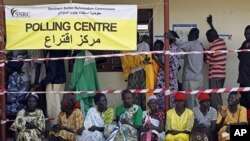South Sudan's High Court agreed Thursday to hear a lawsuit filed against the National Elections Commission (NEC) by opposition political parties who want the vote scheduled for June 30th to be delayed until peace has been restored.
The opposition politicians say that holding elections on June 30th would violate South Sudan’s transitional constitution, and the vote would not be inclusive.
The constitution says there has to be a nationwide census before elections are held, but the government body that would conduct the population count says it cannot do so before the vote. And Lam Akol, chairman of the opposition SPLM for Democratic Change party, said at a hearing on Wednesday to determine if the High Court would hear the case, that holding elections when parts of the country are still in conflict will mean that the vote will not be inclusive.
In December last year, the government approved a budget of 1.5 billion South Sudanese pounds, or around $517 million, for the polls. Last month, the NEC set June 30th as the date for the elections. The opposition parties brought their case against the NEC shortly after the date was set.
Moot point?
But the issue of whether or not elections should go ahead at the end of June may become a moot point if a power-sharing proposal that was agreed to this month by Mr Kiir and rebel leader Riek Machar is finalized.
Under the terms of the power-sharing proposal, which was brokered by the Intergovernmental Authority on Development (IGAD), elections will not be held in South Sudan before the end of a 30-month transitional period, or around December 2017.
The proposal says that a transitional government of national unity will be set up no later than July 9 of this year and will remain in power for 30 months. It also calls for the number of lawmakers in the National Assembly to be expanded from 332 to 400, and for the lawmaking body's tenure to be extended for 30 months, starting on July 9.




